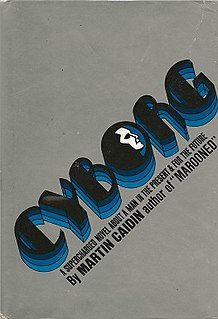Related Research Articles

In medicine, a prosthesis or prosthetic implant is an artificial device that replaces a missing body part, which may be lost through trauma, disease, or a condition present at birth. Prostheses are intended to restore the normal functions of the missing body part. Amputee rehabilitation is primarily coordinated by a physiatrist as part of an inter-disciplinary team consisting of physiatrists, prosthetists, nurses, physical therapists, and occupational therapists. Prostheses can be created by hand or with computer-aided design (CAD), a software interface that helps creators design and analyze the creation with computer-generated 2-D and 3-D graphics as well as analysis and optimization tools.
Biorobotics is an interdisciplinary science that combines the fields of biomedical engineering, cybernetics, and robotics to develop new technologies that integrate biology with mechanical systems to develop more efficient communication, alter genetic information, and create machines that imitate biological systems.
The MacRobert Award is regarded as the leading prize recognising UK innovation in engineering by corporations. The winning team receives a gold medal and a cash sum of £50,000.
Prosthetics, the artificial replacement of organic limbs or organs, often play a role in fiction, particularly science fiction, as either plot points or to give a character a beyond normal appearance. Numerous works of literature, television, and films feature characters who have prosthetics attached.
Biomechatronics is an applied interdisciplinary science that aims to integrate biology and mechatronics. It also encompasses the fields of robotics and neuroscience. Biomechatronic devices encompass a wide range of applications from the development of prosthetic limbs to engineering solutions concerning respiration, vision, and the cardiovascular system.

The Shirley Ryan AbilityLab, formerly the Rehabilitation Institute of Chicago (RIC), is a not-for-profit nationally ranked physical medicine and rehabilitation research hospital based in Chicago, Illinois. Founded in 1954, the AbilityLab is designed for patient care, education, and research in physical medicine and rehabilitation (PM&R). The AbilityLab specializes in rehabilitation for adults and children with the most severe, complex conditions ranging from traumatic brain and spinal cord injury to stroke, amputation and cancer-related impairment. Affiliated with Northwestern University, the hospital is located on Northwestern’s Chicago campus and partners on research and medical efforts.

Cyborg is a 1972 science fiction/secret agent novel, written by Martin Caidin. The novel also included elements of speculative fiction, and was adapted as the television movie The Six Million Dollar Man, which was followed by a weekly series of the same name, both of which starred Lee Majors, and also inspired a spin-off, The Bionic Woman.
Ottobock is a German prosthetics company situated in Duderstadt. It has been responsible for several innovations in prosthetics, including the C-Leg, a computerized knee joint that adaptively varies its passive resistance to suit the patient's different walking gaits, and the Michelangelo Hand, a fully articulated robotic hand prosthesis.
Van Phillips is an American inventor of prosthetics. He is known for the Flex-Foot brand of artificial foot and limbs that he created, and for his charity work for amputees. An amputee himself, having lost a leg below the knee at age 21, Phillips was motivated by the limitations of then-existing artificial limbs to attend the Northwestern University Medical School Prosthetic-Orthotic Center. After graduation, he worked as a biomedical design engineer at the University of Utah before starting his own company, Flex-Foot Incorporated in 1984.
Össur hf. is a company based in Iceland that develops, manufactures and sells non-invasive equipment for orthopaedics, including bracing and support products, compression therapy, and prosthetics. The company is headquartered in Reykjavík, with offices in the Americas, Europe, and Asia, and distributors in other markets.
Stump socks are tubular medical or clothing accessories with a blind end that are fashioned similar to socks, usually without a heel. They are worn on amputation stumps for a number of reasons. As stump socks are typically worn on body parts that do not contain a foot, their definition is distinct from the average sock type garment.

Viktorija Moskaļova, better known as Viktoria Modesta, is a Latvian-born British singer-songwriter, performance artist, creative director, and model. Modesta suffered an injury to her leg during her birth, and had it voluntarily amputated in 2007. She was signed to IMG Models as a model, and as a musician she is also known as a "Bionic Pop Artist". Her music video "Prototype" received a Silver Lion Award at the Cannes Film Festival. She also performed at the 2012 Summer Paralympics closing ceremony and was a guest star at the Crazy Horse in Paris in 2019.
The i-LIMB Hand is the brand name of world's first commercially available bionic hand invented by David Gow and his team at the Bioengineering Centre of the Princess Margaret Rose Hospital in Edinburgh, and manufactured by Touch Bionics. The articulating prosthetic hand has individually powered digits and thumb and has a choice of grips. The i-Limb Hand offers full hand solutions in addition to partial hand solutions. It was launched in Vancouver in July 2007. i-LIMB Hand won the Limbless Association's Prosthetic Product Innovation Award for 2008, was listed at number fourteen in the TIME's list of the Top 50 Best Inventions of 2008, and Touch EMAS/Touch Bionics was awarded The Queen's Award for Enterprise: Innovation (Technology) (2010) for the i-LIMB Hand.
David James Gow CBE is the inventor of the i-Limb prosthetic hand. He was made an honorary Doctor of Science in November 2018 by the University of Edinburgh.
The Princess Margaret Rose Orthopaedic Hospital was a hospital in Fairmilehead, Edinburgh, opened in 1932 and closed in 2000. After closure, with services transferred to the new Royal Infirmary of Edinburgh, it was demolished and the site sold for housing.

Open Bionics is a UK-based company that develops low-cost, 3D printed bionic arms for amputees with below elbow amputations. Their bionic arms are fully functional, with lights, bio feedback vibrations, and different functions that allow the user to grab, pinch, high-five, fist bump, and thumbs-up. The company is based inside Future Space, co-located with Bristol Robotics Laboratory. The company was founded in 2014 by Joel Gibbard MBE and Samantha Payne MBE.

Limbitless Solutions is a 501(c)(3) non-profit organization founded in the United States that uses additive manufacturing to create accessible, yet affordable personalized bionics and prosthetic partial arms for children with limb differences The organization says their bionic arms are manufactured for under $400, 1% of the standard production cost. Headquartered on the University of Central Florida campus in Orlando, Florida, the organization was founded by a team of engineering students, led by CEO and Executive Director Albert Manero.
Rebekah Marine Paster, also known as The Bionic Model, is an American model and motivational speaker. She is a congenital amputee and was born without a right forearm.

Antonio Bicchi is an Italian scientist interested in robotics and intelligent machines. He is professor at the University of Pisa and Senior Researcher at Istituto Italiano di Tecnologia in Genoa. He is an Adjunct Professor at the School of Biological and Health Systems Engineering of Arizona State University in Tempe, Arizona, USA. He is a Fellow of IEEE since 2005, and received the IEEE Saridis Leadership Award and the “Ordine del Cherubino” from University of Pisa in 2019.
Samantha Joanne Payne MBE is the co-founder of Open Bionics, a bionics company developing affordable prosthetics for children.
References
- ↑ "Touch Bionics sold to Icelandic firm Ossur". BBC. 11 April 2016. Retrieved 22 December 2018.